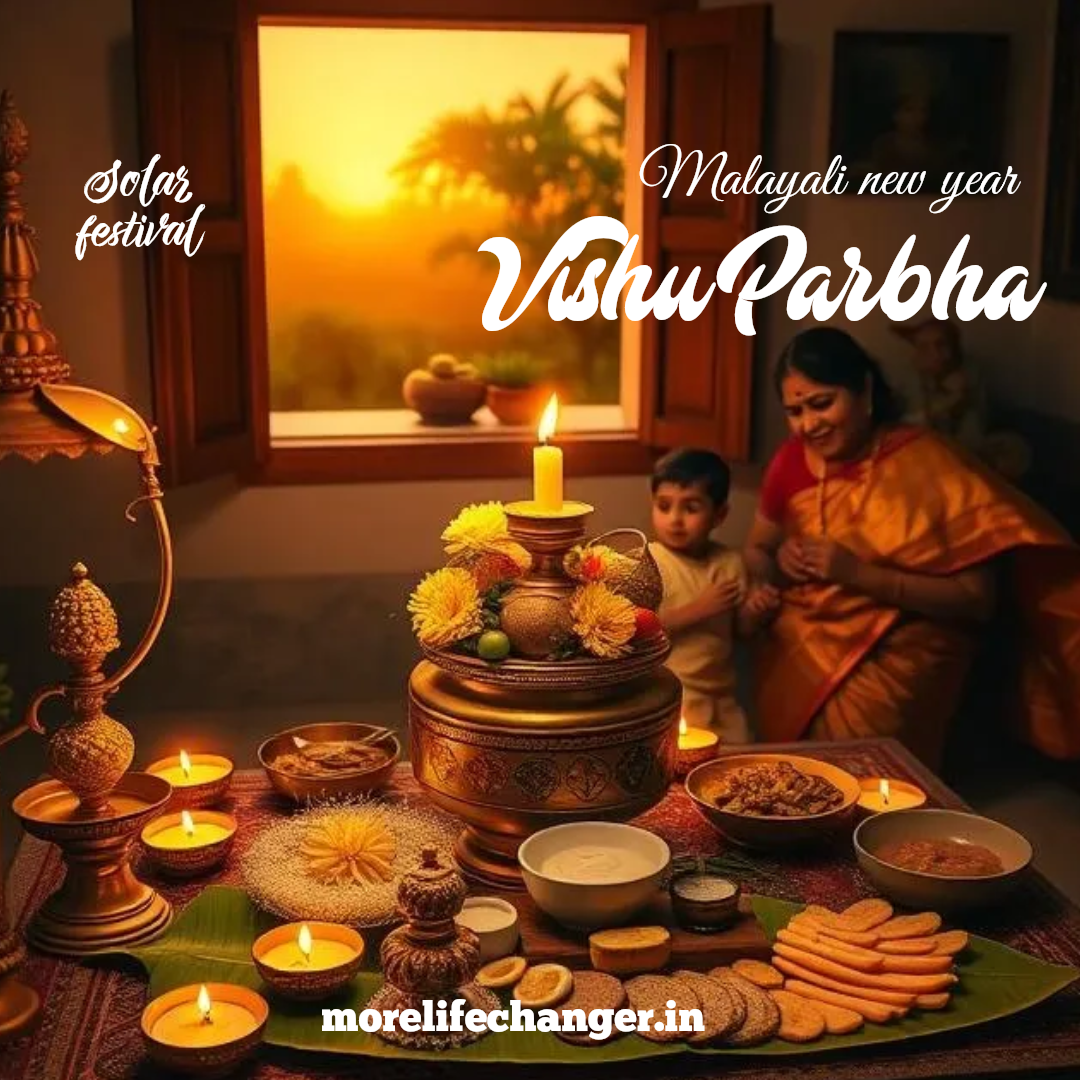Vishu is the Malayali New Year celebrated by the people of Kerala and the Malayali diaspora across the world. It is observed on April 14th or 15th, aligning with the solar transition when the Sun enters Aries (Mesha Rashi) in the Hindu solar calendar. Vishu is not only a new year festival but also a time of spiritual reflection, joy, and thanksgiving, celebrating the harvest and the arrival of the spring season.
Significance of Vishu
- New Year Celebration:
- Vishu marks the beginning of the new year according to the Malayali or Kerala calendar, which is a solar calendar. The day is considered auspicious and symbolizes the start of a new cycle in both agricultural and spiritual terms.
- Vishu also signifies the victory of good over evil, a theme commonly found in Hindu festivals and celebrations.
- Astronomical Significance:
- The day marks the sun’s transition into Aries (Mesha Rashi) and the start of the Uttarayan phase, which brings longer days. In Kerala, this marks the beginning of the harvest season, a time to celebrate the bounties of nature and seek blessings for a prosperous year ahead.
Also read : Solar new year
Rituals and Traditions
1. Vishu Kani (First Sight of the Day)
- The most important and iconic ritual of Vishu is the Vishu Kani. “Kani” means first sight in Malayalam, and it refers to the auspicious items laid out for the first thing a person sees upon waking up on the morning of Vishu.
- The Vishu Kani is traditionally arranged in front of the family altar, often near the idol of Lord Vishnu or Lord Krishna. The items arranged on a tray include:
- Fresh fruits (especially mangoes and coconuts),
- Yellow flowers (often Kanikonna or cassia fistula, the golden shower tree flower, symbolizing prosperity),
- Rice, coins, new clothes,
- A mirror (to reflect the auspicious items),
- Lord Vishnu’s idol or photograph.
- The head of the household, usually the eldest person, arranges the Vishu Kani the night before, and family members are expected to wake up early in the morning and look at the Vishu Kani before doing anything else. It is believed that what one sees first on this day will set the tone for the entire year.
2. Vishu Sadya (Feast)
- Vishu Sadya is a grand feast served during the Vishu celebrations, typically involving a variety of vegetarian dishes prepared using fresh seasonal produce. The Sadya is a traditional banquet typically served on a banana leaf and consists of numerous items.
- The meal includes dishes like:
- Sambar (a lentil-based vegetable stew),
- Avial (a mixed vegetable dish with coconut and yogurt),
- Thoran (a dry vegetable dish made with coconut),
- Pachadi (a yogurt-based salad),
- Pickles,
- Payasam (a sweet dessert, usually made from rice or vermicelli).
- The food is a reflection of the agricultural harvest, and each dish has a symbolic meaning of good health, wealth, and prosperity.
3. Fireworks and Crackers
- Fireworks and the bursting of firecrackers is a significant part of Vishu celebrations in Kerala. The loud noises and bright lights are believed to ward off evil spirits and bring good fortune.
- Families and communities often have fireworks displays in the evening, creating a vibrant and festive atmosphere.
4. New Clothes
- Wearing new clothes is an essential part of Vishu celebrations. It symbolizes a fresh start and is believed to bring prosperity and good fortune in the coming year. Many people wear traditional Kerala attire, such as Mundu (a traditional Kerala garment for men) and Kasavu Saree (a traditional white saree with gold borders, worn by women).
5. Blessings and Gifting
- Vishu is a time for family bonding, and elders often give their younger relatives money, known as Vishu Kaineettam. This is typically given in small amounts and symbolizes the transfer of blessings for good fortune in the coming year.
- The elders will bless their children and grandchildren with the hope of bringing them prosperity and happiness.
6. Temple Visits and Prayers
- As with most major Hindu festivals, many people visit temples on Vishu to seek the blessings of the gods, especially Lord Vishnu or Lord Krishna.
- People also engage in prayers and pujas (rituals) at home, offering thanks for the harvest and asking for blessings for a prosperous future.
7. Cultural Celebrations
- In Kerala, Vishu is also marked by cultural performances. Traditional Kathakali dance, Kootiyattam, Thiruvathira, and Mohiniyattam performances are often held during the festival to celebrate Kerala’s rich artistic traditions.
Vishu in the Modern Context
While Vishu is deeply rooted in tradition, it has evolved over the years, especially in urban areas and among the Malayali diaspora. Social media and digital platforms now allow people to connect with family and friends, share greetings, and celebrate the festival virtually. In cities like Kochi, Trivandrum, and Kozhikode, grand processions, public gatherings, and community events are held to celebrate the festival.
Vishu vs Other Regional Celebrations
While Vishu is a uniquely Kerala celebration, it shares similarities with Baisakhi in Punjab, Puthandu in Tamil Nadu, and Baisakh in Bengal. These festivals, all based on the solar calendar, mark the new year and the arrival of the harvest season in their respective regions, often with shared themes of agriculture, spirituality, and family unity.
Please join discussion on Facebook about world facts and its secret .

